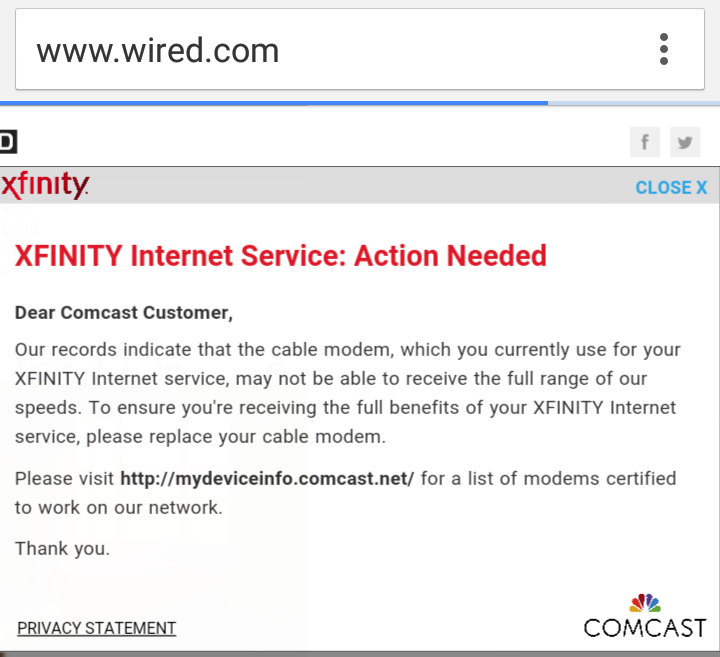Why Is Comcast Interrupting My Web-Browsing To Upsell Me On A New Modem?

Comcast says that the only way for Consumerist reader BB to stop seeing these pop-up alerts is to upgrade his modem.
Consumerist reader and Comcast customer “BB” says that the cable company upgraded the network in his area in recent months, and has been writing and calling him regularly about upgrading his modem ever since.
“For months we received multiple letters in the mail, explaining how we were missing out on the great new capabilities of their network,” writes BB. “This eventually escalated to repeated phone calls from Comcast, stating that we should really upgrade our modem.”
Thing is, BB owns the modem he uses and he’s experienced no problems with service or speeds since the network upgrade. He’d rather not spend money on a new modem — or pay Comcast too much to rent one from the company — when what he has is working just fine.
And BB is not some minor Internet user with an ancient desktop computer that he only uses to check email once a week. In fact, he’s a software developer living — like many of us — in a home with multiple web-connected devices.
“We stream Netflix and YouTube and our Internet speed is great for everything we need,” he writes. “Why should I spend the money?”
BB knows that sometimes customers can indeed be left out in the cold by using old tech — just ask all those people who had to scramble for digital antennas and cable boxes when that changeover happened — so he called Comcast to ask exactly what he was missing out on with his old modem. He says the support rep would only tell him that he wasn’t enjoying the full benefits of the upgraded modem, but failed to provide any real technical info about what this meant.
“Now they’ve moved to more aggressive measures to try to get me to upgrade,” writes BB. “The other day as I was browsing the web on my phone, on my home WiFi, I got a pop-up notice while browsing on wired.com.” (see screenshot above)
In big red letters, the notice alerts BB that there is some “Action Needed” on his service.
It reads:
“Our records indicate that the cable modem, which you currently use for your XFINITY Internet service, may not be able to receive the full range of our speeds. To ensure you’re receiving the full benefits of your XFINITY Internet service, please replace your cable modem.”
“This feels like a step too far,” writes BB. “It just feels invasive in a way I’m not comfortable with.”
A Comcast exec we talked to argued that this is not an attempt to upsell the customer on a new modem, and instead characterized the alert as an educational tool to let the customer know that their device may be nearing the end of its life cycle. They explained that while an older modem may work, it may also no longer be receiving necessary, regular software updates and bug fixes.
The exec points to Comcast’s impending rollout of DOCSIS 3.1 technology — which allows for gigabit Internet speeds over existing cable lines. Taking advantage of that leap in speeds will also require users to switch out to newer modems.
Unfortunately for BB, the only way to stop the upgrade alerts from showing up in his web browser is to eventually upgrade his modem. There is currently no way to opt out of these injected notices.
For now, BB seems content with his setup.
“If they want me to upgrade my modem so badly they can send me a new one, or put a credit on my bill to pay for one that I buy myself,” he writes. “Until then, I’m perfectly happy with my Internet speed and will use my modem until it stops working.”
Want more consumer news? Visit our parent organization, Consumer Reports, for the latest on scams, recalls, and other consumer issues.

